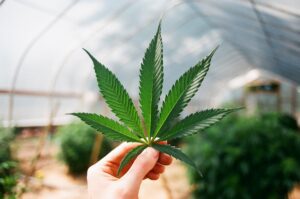
The Cabinet of Ministers of Ukraine has supported a bill on the use of medical cannabis preparations for the treatment of certain diseases, Minister of Health of Ukraine Viktor Lyashko said on his Facebook page.
“We have prepared a legislative framework to ensure the full production cycle of cannabis-based drugs in Ukraine: from cultivation and processing to full-fledged production,” Lyashko said.
He also noted that cannabis medicines should not be identified with narcotic substances, since they do not have a psychoactive effect, and the measures for regulating their circulation are different.
“Medical” cannabis contains cannabidiol, which does not have a pronounced psychoactive effect, so it is not interesting for recreational use. At the same time, we still propose to establish strict control over the cultivation, production and sale of drugs, understanding the sensitivity of this issue in society,” Lyashko explained.
Cannabis-based preparations are used to reduce pain, muscle spasms and cramps, treat anorexia, PTSD and anxiety disorders. In addition, they are used in the treatment of certain types of epilepsy, glaucoma, psoriasis, parkinsonism, and multiple sclerosis. An important task of this medicine is to alleviate pain and suffering for seriously ill and palliative patients, including cancer patients, patients with HIV.

The Ukrainian company, HF Agro LLC (Kharkiv), has launched new production lines in the south of Poland, having established a full cycle of production of Gekon disc harrows, the company’s website reported on Tuesday.
“Poland is a large and competitive market. In addition, it is possible to establish exports to other EU countries through it. The launch of a new production site will improve work on the European market and increase the competitiveness of products,” the company said in a statement.
The manufacturer noted that the new line of Gekon disc harrows does not require periodic maintenance due to the sealing of bearing units, which saves time for its users.
HF Agro is an agricultural machinery brand created in 2020 by Roman Hirshfeld, who previously held the position of president for production of tillage equipment of the agricultural equipment manufacturer Lozova Machinery.
The brand’s product line includes reversible plows, disc, tooth, rotary and loop harrows, subsoilers and slot cutters, field cultivators and seedbed preparation units. The product range also includes a large selection of spreaders, applicators for liquid fertilizers and ammonia, grain packers and unloaders, field rollers for soil compaction before and after sowing.

The Dneprospetsstal electrometallurgical plant (Zaporozhye) has resumed production, including for the purpose of supplying stainless steel to PJSC Centravis Production Ukraine (Centravis Production Ukraine), which is part of the Centravis Ltd holding.
“There is news from our main billet supplier, Dneprospetsstal. On May 29, we launched work and started producing billets for Centravis. The planning department keeps abreast and redirects the metal for production and order fulfillment at lightning speed,” he said in a letter to customers ” Centravis” Chief Sales Officer (CSO) Artem Atanasov on Friday.
At the same time, he noted that the aggressor continues to inflict missile and air strikes on the military and civilian infrastructure of Ukraine. On the night of June 2, Russian troops again fired at the areas of the Dnepropetrovsk region, bordering on the Kherson region.
“Fortunately, the situation in Nikopol is under control, all departments are functioning, the necessary services are being provided. Production processes at Centravis continue. Despite the howling of sirens, the cold and hot shops are working to fulfill plans and produce pipes on time,” the letter states. .
And it is added that the company’s logistics team is actively working and constantly looking for the best and safest ways to deliver finished products. This is done by members of the board of directors who continue to work in Ukraine.
There are also Centravis sales offices around the world – in Essen, Milan, Krakow, Lugano, Houston and Dubai.
“Summing up the results of May, I would like to note the successful completion of the audit of pipes for the Hinkley Point C nuclear power plant (UK). Representatives of Buhlmann and Bilfinger highly appreciated the quality of the pipes, which fully comply with the requirements of RCCM and EN standards. The Centravis team is proud of its participation in the project, which makes the world a better place and our planet cleaner,” the sales director emphasizes in the information.
And it is added that the company will never get tired of thanking for the support provided by customers. “Ukraine’s victory is inevitable!” the letter concludes.
“Centravis” is one of the world’s largest manufacturers of seamless stainless steel pipes, founded in 2000. Its production facilities are located in Nikopol (Dnepropetrovsk region). Included in the top 10 world players. Before the Russian aggression, more than 1,400 people worked at the enterprise.
Holding Centravis Ltd. was created on the basis of CJSC “Nikopol Stainless Pipe Plant”, service and trading companies LLC “Production and Commercial Enterprise “UVIS”. Its shareholders are members of the Atanasov family.
Owned by Centravis Ltd. 100% of the shares of PJSC “Centravis Production Ukraine” is located.
Dneprospetsstal is the only Ukrainian manufacturer of long products and forgings made of special grades of steel: stainless steel, tool steel, high-speed steel, bearing steel, structural steel, as well as nickel-based heat-resistant alloys.

The production of fresh dairy products in Ukraine in May will be 17-20% lower compared to May last year, which corresponds to a reduction in the country’s population due to mass migration abroad during the war, and also correlates with the demand and solvency of Ukrainians.
“The current situation on the Ukrainian market of fresh dairy products can be called relatively stable. Most of the leading producers have increased output to the level of real demand, which stops growing due to a decrease in the population’s solvency in war conditions,” the website of the industry analytical agency Infagro reported on Wednesday.
According to him, the increase in the production of dairy products is now inexpedient, since in the event of a further increase in its production, dairy processors will have to stimulate sales through mass promotions in retail chains.
“Not all operators can now afford such marketing steps, and networks also pay less attention to such tools, there is not enough human resources. Moreover, in the face of a further rise in the cost of logistics, some companies intend to further increase prices, even if this leads to a decrease sales,” the agency said.
It noted that in May in the market of fresh dairy products, as in April, the leading positions will be held by national companies. At the same time, their production is unlikely to continue to grow in the summer months.
As reported, the profile association “Union of Dairy Enterprises of Ukraine” predicted a decline in milk production in Ukraine in 2022 by 13.3-15.9%, to 7.33-7.56 million tons from 8.73 million in 2021 due to for the Russian military invasion.

A memorandum of cooperation in the development and implementation of projects for production of green hydrogen in Ukraine was signed by PrJSC Ukrhydroenergo with the German companies Andritz Hydro and MAN Energy Solutions, Andriy Lets, head of the project technical support department at Ukrhydroenergo, said.
“A memorandum was signed with Andritz Hydro and MAN Energy Solutions on cooperation in the development and implementation of projects for production of green hydrogen in Ukraine. Today, in a war, this topic is extremely important not only for Ukraine, but for entire Europe,” he said during an Energy Club online discussion “Hydrogen production in Ukraine. Resource base” on Thursday.
Lets expressed his conviction that the signing of the memorandum would launch global processes that would help create a so-called hydrogen hub in our state in the future, with the advent of which Ukraine can achieve real energy independence.
At the same time, it is specified that Ukrhydroenergo, together with Andritz Hydro and MAN Energy Solutions, are considering and carrying out fruitful work on a pilot project for launching a 1 MW electrolysis plant for production of green hydrogen.
“There are many issues in terms of legislation, technical capabilities that are being worked out today,” the representative of the Ukrainian hydro-generating company explained the situation.
According to him, according to the pilot project, we are talking about production of 100 kg of hydrogen per day. At the same time, Lets noted that Ukrhydroenergo has the potential to produce green hydrogen with the use of renewable sources through water electrolysis.
“This is a promising type of energy, which is also important for decarbonization of the economy and Ukraine’s entry into new markets,” he summed up.
ANDRITZ HYDRO, COOPERATION, HYDROGEN, MAN ENERGY SOLUTIONS, PRODUCTION, UKRHYDROENERGO

Dniprospetsstal electrometallurgical plant (Zaporizhia) has begun a gradual launch of production, including for the purpose of supplying stainless steel to PrJSC Centravis Production Ukraine, which is part of holding Centravis Ltd.
Chief Sales Officer (CSO) Artem Atanasov said in a letter to Centravis customers that the company is experiencing a positive trend in the supply of pipe billets for production.
“Dniprospetsstal, our main billet supplier, is gradually launching production, and in the near future we expect stable supply volumes,” Atanasov stated.
According to him, Centravis is operating normally, both in hot and cold shops. At the same time, in the hot production, all actual performance indicators are higher than planned, in the cold shop, several lines operate at the level of stable operation before the war.
The sales director recalled that the plant began to offer products and take orders.
“Your continued support (from customers) is extremely important to us at this stage. Buying pipes from Centravis means that you support the restart of the Ukrainian economy, which is now more important than ever. Our logistics team is actively working and constantly looking for better and safer ways for delivery of finished products,” Atanasov emphasized, adding that the company is actively preparing for participation in the Tube&Wire exhibition, which will be held in Dusseldorf on June 20-24.
Centravis is one of the world’s largest manufacturers of seamless stainless steel pipes, founded in 2000. Its production facilities are located in Nikopol (Dnipropetrovsk region). It is included in the top 10 world players. Before the Russian aggression, more than 1,400 people worked at the enterprise.